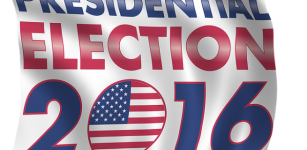Trump vs Clinton: Crime Policies of the US Presidential Candidates

Later today, voters will decide who will be the next US President.
While Australia is on the other side of the world, US policies on domestic and international law enforcement are influential well beyond the country’s borders – and indeed throughout the developed world.
Without delving into the election’s contentious issues of race and immigration, a discussion of the respective policies of presidential front runners Hillary Clinton and Donald Trump provides an insight into the direction the country is heading.
The present state of the US system
One in every 100 adults in the United States is incarcerated, with two-thirds of released inmates returning to prison within two years.
The US spends over US$60 billion per year on incarceration alone, a figure that has tripled over the past 20 years.
Like in Australia, there is a significant racial disparity in the US when it comes to imprisonment rates. There, the national incarceration rate is 2,306 per 100,000 for black people, five times the rate of 450 per 100,000 for white people.
And according to a 2014 Human Rights Watch report, “tough on crime” laws adopted since the 1980s have filled US prisons with non-violent offenders. Just over half (53.4%) of those in state and federal facilities with a sentence of more than a year are non-violent offenders, many of whom have been convicted of minor drug offences.
A study by the Urban Institute found that the increase in sentence lengths for federal drug offenders “was the single greatest contributor to growth in the federal prison population between 1998 and 2010.”
Trump v Clinton:
- Public vs private prisons
Donald Trump has expressed support for private prisons.
“I do think we can do a lot of privatizations and private prisons. It seems to work a lot better,” he said during a debate in March. This is consistent with his focus on smaller government and privatization.
Meanwhile, Hillary Clinton has pledged to “end private detention centers”, recognising they incentivise incarceration. Clinton says she no longer accepts donations from private-prison lobbyists, vowing to continue working with the Department of Justice to phase out private federal prisons.
- The death penalty
Mr Trump wants to increase the use of the death penalty, saying he will sign an executive order implementing mandatory death penalties for those convicted of murdering police officers.
Indeed, Trump took out four full-page ads in New York newspapers in 1989 demanding the death penalty against five suspects in a rape case. The young black and Hispanic males were later cleared of all charges.
Mrs Clinton also supports the death penalty, splitting with the Democratic Party to appear tough on crime. When confronted by a death row inmate exonerated just prior to his execution, Clinton maintained that the capital punishment should be available for those who commit “really heinous crimes”.
- Criminal justice reform
Mr Trump has consistently supported tougher law enforcement strategies.
In his nominating speech at the RNC in July, Trump slammed “this administration’s rollback of criminal enforcement”. He supports police ‘stop and frisk’ powers, zero-tolerance policies and lengthier prison sentences.
Mrs Clinton has recently tried to distance herself from the ‘tough on crime’ policies she pushed for as First Lady.
In 1994, the Violent Crime Control and Law Enforcement Act called for 100,000 more police officers, provided billions of dollars of funding to prison construction companies, and ramped up the use of mandatory minimum sentences and tough parole laws. By the time Bill Clinton had left the White House in 2001, the number of Americans in prison had increased nearly 60 percent.
It is interesting to note that two weeks after the above Crime Bill was signed, the Clinton administration started deregulating banks with the Riegle-Neal interstate banking bill. That bill, among others, made it harder to prosecute misconduct by bankers while poor people were being locked up in record numbers. Part of the bill was the notorious ‘100-to-1 sentencing policy’, which saw 1 gram of crack (the drug choice of the poor) receive the same sentence as 100 grams of cocaine (the drug choice of the wealthy).
Mrs Clinton has now admitted that the bill played a significant role in the mass incarceration of low level drug offenders. She now claims to support halving the minimum mandatory sentence for drug offences, and has recognised that, “drug and alcohol addiction is a disease, not a crime — and we need to treat it as such.”
In an effort to keep young people out of prison, Clinton says she will dismantle the “school-to-prison pipeline” by providing $2 billion in funding to social support programs in schools.
- Drug laws
Mrs Clinton says she is in favour of reclassifying marijuana to allow for its medical use.
She has been less decisive about recreational marijuana, saying she will review the policies of states that have already legalised the drug for personal use, such as Colorado.
Mr Trump also says he supports legalising medical marijuana, and has expressed the view that it should be “up to the states” to legalise the drug’s recreational use.
It is unlikely that either candidate will decriminalise other prohibited drugs.
- Political rhetoric
Law reform advocates have consistently stated that pandering to the popular will can be a barrier to effective evidence-based law reform.
As Don Weatherburn from the Bureau of Crime Statistics and Research puts it, “[t]oning down the political rhetoric” is conducive to investment in what works, which is not necessarily consistent with what wins votes.
Mr Trump appears to be in the populist camp – regularly using emotionally charged rhetoric and playing on popular fears to win votes.
But Mrs Clinton has certainly also been guilty of the same tactic, especially in the past. When dealing with the problem of gang violence in 1996, Clinton said “They are often the kinds of kids that are called superpredators — no conscience, no empathy. We can talk about why they ended up that way, but first, we have to bring them to heel.”
Clinton has since apologised for that statement, but is a seasoned politician who many believe will do and say what she need to in order to secure votes.
The wash up…
Many who support Mr Trump have had enough of traditional politics, and politicians for that matter – believing the billionaire brings something new and different to the table. They feel there is a need to be ‘tough on crime’, despite the countries rising incarceration rate and the problems that come with it.
Many of those in the Clinton camp recognise the economic and social problems that come with locking up non-violent offenders under punitive approaches to criminal justice, and that diversionary and preventative models offer better outcomes for both the economy and society as a whole.
We will soon know which way the world’s superpower is headed.






